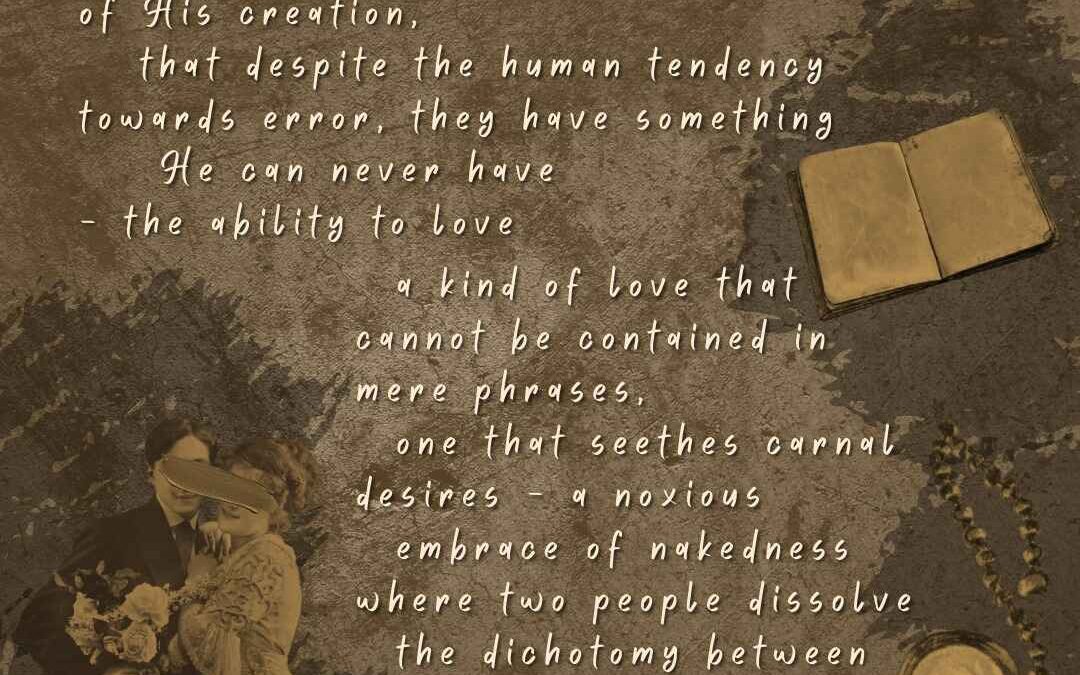I had a certain predilection for strange musings, thoughts that might not inhabit the commoner’s minds. My earliest recollection was nagging my parents with questions like, ‘What happened before the big bang?’ ‘Why do we ask for blessings from these inanimate statues when we’re the ones who garb them in gold?’ ‘Who plotted the stars in the sky to serve as the moon’s companions during the nighttime?’
‘Was the sun ever jealous to not have joined such a party?’ But the sun, majestic with its rays, might deem these stars unnecessary, mere adornments to an already sublime canvas for us to behold.
From this train of thought, I arrived at another, some harmless and some with the potential to raise the hackles of the elders in my family with professed faith. But as a child thirsting for knowledge, I eagerly defended that our imagination should not be restricted by these bounds; we should be free to cultivate our thoughts and fashion them to our liking, no matter how trivial, no matter how absurd.
So, I was drawn to the idea of a recluse God, that being the mind behind it all, accoutered him an inconspicuous downside. His ability, unique to him, to see the future and give our fate an ultimatum impaled him with sincere expression. If He already knew Abraham would go on and sacrifice Isaiah, did a sense of gratification still linger in His heart upon witnessing that display of reverence?
Or when Adam and Eve ate the forbidden fruit, why did He cast them out when their acts were something He had merely foreordained? The fall of mankind was subject to His own downfall alone because we were His creation; in the psalmist’s own words, He knew our very thoughts.
Thus lies the foundation of some heresies’ belief that God, sitting on His Almighty throne, looked down upon us with a condescending gaze. But I pondered upon a completely reversed supposition. I dared think He was not drowning in pride and anger towards His creation because to feel such things, He must have procured a connection between Him and us first. But God, magnanimous, all-knowing, and immune to flaws, could never identify with humankind, who thrives upon destruction and disorder. What then was the need to rage over something He could not understand?
So, I dared say, He did not dart a disdainful look at us but rather a look of envy. I believed God was jealous of His creation, that despite the human tendency towards error, they had something He could never have—the ability to love. And no, I did not allude to your love for your brother, your parents, your friends, or yourselves. Such love was of ordinary nature, something we witnessed every day at home or academe, something He had displayed for us eons ago to imitate dutifully.
But a kind of love, one that could not be contained in mere phrases, one that seethed with carnal desires—a noxious embrace of nakedness where two people dissolved the dichotomy between their mortal bodies and became unified into one—was the kind of love God could never relate to. And I think that’s why He was deemed detached from human affairs—that despite being all-knowing, He can never be an all-feeling god.
Despite these blasphemous averments, I could not help but empathize with Him. A foolish man would contrive to say, “What a shame to dwell in Heaven, but not experience the real heaven,” and then you would ask his idea of heaven, and to him, it was sinking into the bosoms of different women. His idea of worship was not caged in memorized hymns, boisterous praises, or solemn devotion. It was simply lying above or beneath his muse, venerating every part of her body with holy kisses and touch; it was glorifying her existence with lovely thrusts, with or without the intention to plant a seed.
Such heaven would cast away God.
And such heaven would forever be out of my reach.
I, imputed with mildness in manner and speech, burdened with inaptitude in taking part in any gaiety, had been lodging inside my head as a timepass. And simultaneously, I would unfasten the hook of my window, gaze at the world outside, and capture any wonderful moments betiding. Whether it was children playing tag in the mud during July rainfall, a senile man walking his dog minutes after the sun rose, or couples having a meaningful embrace down the amphitheater, these lovely scenes were the cases I was meant to unravel, a foreign language to decipher, or a puzzle to slog away for days.
And yet, despite all my efforts to rationalize the concept of love, it remained an elusive mystery that could not be easily hammered into my mind. Just like how Descartes established a distinction between mind and physical body, my soul purposely rejected the notion of love—two nemeses refusing to coexist in one reality. And so, they remain “mutually exclusive.” For one to exist, the other must die. And God, how I’d rather spend my days slacking off with these abstruse thoughts than waste my energy cultivating another soul.
Before you pass me your judgment, I would like to unburden the fact that I was not a Camus stranger to the concept of love. At home, I’ve been fed up with the concept of love every day. When my mother grew sultry because she found out my father watched The Modern Family without her, he immediately bought a dollar store cake, drew a caricature of the series’ characters on it (with the face of Gloria being the biggest of them all), and scribbled a line of “I’m the cool dad. That’s my thing.”
Last year, during the Pride Month event, a girl from the Liberal Arts department snatched the mic from the emcee and broadcasted to the whole campus how she adored her girlfriend. Of course, she would be given suspension, but the thrill of expressing their love to that extent, she said, was all worth it.
You see, I witnessed love every day. On television screens, love was a flower bouquet, bundles of Ferrero Rochet, teddy bears, blind dates, kisses, and sex—or if you were the prude type, you would reserve the sex after marriage.
I consumed love like a religion every day, and yet I felt like the prodigal son who squandered love in his past lives and completely lost the ability to perceive it in his present incarnation. Was I to blame for this predisposed misery? Or the misery of the sun’s isolation—that despite being printed on the same canvas, he could never kiss the moon or mingle with stars?
Should I blame God?
Should I blame God for plotting the stars in the night sky, leaving the sun a solitary subject who greeted us when we woke up?
Should I blame God for designing my disposition, akin to Him, a detached spectator overseeing love happening between candid moments of affection, but not being able to relate to them all?
What if God just never wanted to bear his struggle alone?
____
The celebration of love month continues! ![]()
![]()
Anticipate the remaining stories we have prepared in light of Valentine’s Day!

